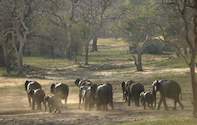
Despite what South African National Parks (Sanparks) terms as "conflicting and irreconcilable" differences of opinion between stakeholders concerned with the management of elephants, the elephant debate will once more be opened to all.
Environmental Affairs minister Marthinus van Schalkwyk has declared that "one of the most emotive issues within regional conservation" will be open for public comment when Cabinet has finished drafting National Norms and Standards which will guide elephant management in national, provincial and private nature reserves. "
These guidelines are expected to be published by the end of the year. Time is a major factor, as Sanparks has called for decisive action, saying it has recommended that, "a decision on the use of culling as a legitimate option for management of elephants, and the approval of norms and standards should not be delayed beyond March 2006".
Tasked with preserving the country's biodiversity, Sanparks acknowledges that natural systems are complex and unpredictable, and that scientists are likely to be certain about biodiversity losses only when the losses have already occurred, but that existing biodiversity losses are increasingly irreversible.
Their Elephant Management Strategy presented to van Schalkwyk this month says that "There are biodiversity concerns with regard to the management of elephants in the Kruger, Mapungubwe, Marakele and Addo Elephant National Parks and in the case of Kruger there is a grave risk of economic impacts resulting from disease spread."
They estimate that elephant breaking Kruger's western fence and the subsequent escape of diseasecarrying buffalo has cost the state R93 million in the last foot and mouth outbreak alone. An effective, although not elephantproof, fence is estimated to cost in the region of R37 million.
Sanparks recommend that elephant management plans are adopted on a reserve-by-reserve basis, looking at each protected area individually, with necessary stakeholder consultation. In smaller protected areas with no buffer zones "biodiversity is very likely to be degraded if population management is not practiced."
As well as culling, other management options include contraception, translocation, conservation corridors, and reinforced and upgraded fences. Any population control methods (such as contraception and culling) should ideally be approved an ethics committee, say Sanparks.
Ethics committees typically involve vets and experts who research using experimental animals. Sanparks say that ethics committees do not replace stakeholder consultation, but "provide an independent judgement informed by specialist expertise."
At a media conference van Schalkwyk said, "I am persuaded that the 'do nothing' option is not an option." He said that the all viable alternatives would be considered, but that the final solutions to elephant management would be "based on scientific research, ethical and social considerations, indigenous knowledge, and environmental and tourism impacts.'
By Melissa Wray

 In and around Kruger National Park (KNP), the issue of elephant management is highly debated, as some scientists argue that there are too ma...
In and around Kruger National Park (KNP), the issue of elephant management is highly debated, as some scientists argue that there are too ma...